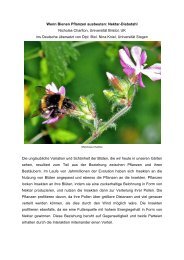PhDâ€theses - Ethologische Gesellschaft
PhDâ€theses - Ethologische Gesellschaft
PhDâ€theses - Ethologische Gesellschaft
Create successful ePaper yourself
Turn your PDF publications into a flip-book with our unique Google optimized e-Paper software.
CONTEXT‐DEPENDENT LEARNING PERFORMANCE IN RELATION TO AVIAN PERSONALITIES<br />
Mieke Titulaer<br />
m.titulaer@nioo.knaw.nl<br />
Research Update<br />
Master thesis, supervised by Prof. Dr. Marc Naguib and Dr. Kees van Oers, Department of Animal<br />
Ecology, Netherlands Institute of Ecology (NIOO‐KNAW), Heteren, the Netherlands<br />
Adaptation to environmental changes is facilitated by good learning abilities. Individuals<br />
differ in their learning abilities, but little is known on how such variation is linked to<br />
consistent behavioural differences among individuals (personality traits). Great tits (Parus<br />
major) differ consistently in their exploratory behaviour in a novel environment, and this<br />
correlates with a range of behavioural traits. It thus can be used as proxy for personality.<br />
Here we subjected birds to a dimensional shift learning paradigm to study the link between<br />
learning and personality. The learning paradigm included several stages differing in<br />
complexity. First, the birds were trained to find food under one of two colours or at one of<br />
two locations, after which the previously unrewarded colour or location became rewarded<br />
(reversal). Then, two new colours and locations were given (intra‐dimensional shift) and<br />
finally, the rewarded dimension was changed from colour to location or vice versa (extra‐<br />
dimensional shift). Previous studies have shown that fast exploring individuals are less<br />
flexible than slow explorers. Therefore we expected slow explorers to perform better in the<br />
reversal and extra‐dimensional shift, which are established measures of flexibility. The<br />
results show that reversal learning was the most difficult stage and apparently it was the<br />
only stage in which personality differences in performance were found, but in opposite<br />
direction for males and females. Fast exploring males showed more flexible learning abilities<br />
than slow males, whereas in females slow explorers outperforming fast explorers. The sex‐<br />
specific relationship between exploratory behaviour and performance on the reversal task<br />
shows that personality may have important consequences for the capacity of an animal to<br />
adapt to the environment, depending on sex and context, with possible fitness implications<br />
in the wild. These context‐dependent and sex‐specific personality effects are in line with<br />
field studies and show the importance of experimental work for uncovering mechanisms of<br />
evolutionary processes in the wild.<br />
23



